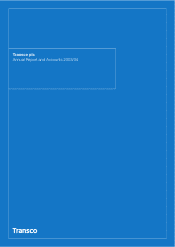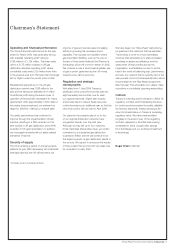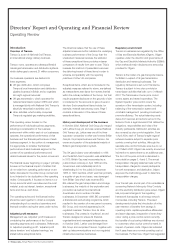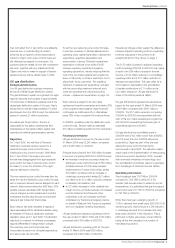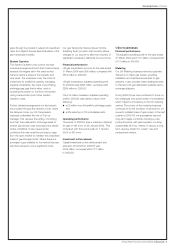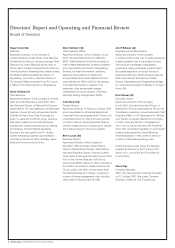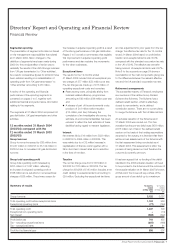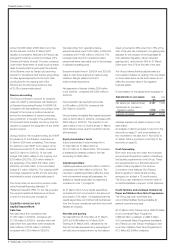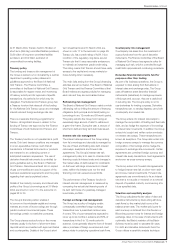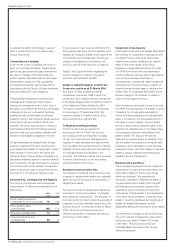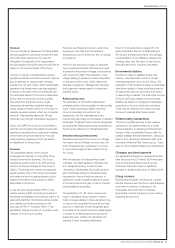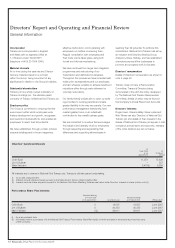National Grid 2004 Annual Report Download - page 4
Download and view the complete annual report
Please find page 4 of the 2004 National Grid annual report below. You can navigate through the pages in the report by either clicking on the pages listed below, or by using the keyword search tool below to find specific information within the annual report.
2Transco plc_Annual Report and Accounts 2003/04
Introduction
Overview of Transco
Transco is a part of National Grid Transco,
an international energy delivery business.
Transco owns, operates and develops Britain’s
natural gas transmission and distribution systems,
which deliver gas to around 21 million consumers.
Our business operations are divided into
three segments:
UK gas distribution, which comprises
Transco’s local transmission and distribution
pipeline business in Britain and is organised
into eight regional networks;
UK gas transmission, which operates the
national transmission system (NTS) and which
is managed jointly with National Grid Transco’s
electricity transmission activities; and
other activities, which mainly comprises
Transco’s regulated gas metering activities.
This operating review focuses on the
performance of individual business segments,
including a consideration of the business
environment within which each of our businesses
operates, the operational performance of that
business and the financial performance of each
business segment. In the opinion of management,
it is appropriate to consider the financial
performance of each business segment in the
context of its operational performance and
related business issues for the period concerned.
The financial review beginning on page 7 primarily
focuses on the financial impact of matters that
do not arise from operating performance or are
better discussed in the wider Group context and
is not intended to be duplicative of the operating
review. Consequently, it focuses on items in our
Group accounts which we believe are the most
material, such as interest, taxation, exceptional
items and Group cash flows.
The operating review and the financial review
should be read together to obtain a complete
understanding of our results of operations and
financial condition during the years under review.
Adjusted profit measures
Management use ‘adjusted’ profit measures in
considering the performance of the Group’s
operating segments and businesses. References
to ‘adjusted operating profit’, ‘adjusted profit
before taxation’ and ‘adjusted earnings’ are
stated before exceptional items.
The Directors believe that the use of these
adjusted measures better indicates the underlying
business performance of the Group than the
unadjusted measures because the exclusion
of these exceptional items provides a clearer
comparison of results from year to year. This is
because this method of presentation removes
the distorting impact of these items in order to
enhance comparability with the reporting
practices of other UK companies.
Exceptional items, which are not included in the
adjusted measures referred to above, are defined
as material items that derive from events that fall
within the ordinary activities of the Group, but that
require separate disclosure on the grounds of size
or incidence for the accounts to give a true and
fair view. Such exceptional items include, for
example, material restructuring costs. Page 7
contains a discussion of the nature of these
exceptional items.
History and development of the business
In October 2002, National Grid Group plc merged
with Lattice Group plc and was renamed National
Grid Transco plc. Lattice was one of the three
successor companies to what was formerly British
Gas plc. Its principal business was Transco, the
owner and operator of the substantial majority of
Britain’s gas transportation system.
The UK gas industry was nationalised in 1948
and the British Gas Corporation was established
in 1973. British Gas was incorporated as a
public limited company in April 1986 and the
Government sold substantially all of its
shareholding in it to the public in December
1986. In 1997, Centrica, which was then primarily
a supplier of gas to end users, was demerged
from British Gas which was renamed BG.
BG retained the gas transportation and storage
businesses, the majority of the exploration and
production as well as the international
downstream and a number of smaller
businesses. In December 1999, BG completed
a financial and restructuring programme which
resulted in the creation of a new parent company,
BG Group, and involved separating its UK
regulated business, Transco, from its other
businesses. This created a ‘ring-fence’ around
Transco designed to ensure its financial,
organisational and managerial independence.
In October 2000, Lattice was demerged from
BG Group and comprised Transco, together with
start-up telecommunications and non-regulated
infrastructure services businesses.
Regulatory environment
Transco’s businesses are regulated by the Office
of Gas and Electricity Markets (Ofgem). Ofgem
operates under the direction and governance of
the Gas and Electricity Markets Authority (GEMA),
which makes all major decisions and sets policy
priorities for Ofgem.
Transco is the holder of a gas transporter licence
for Britain in respect of its gas transmission,
distribution and metering businesses. The
regulatory framework is set out in this licence.
Transco is subject to two price controls for
transmission activities that both run to 31 March
2007. The Transmission Owner price control
covers assets and related expenditure. The
System Operator price control covers the
operation of the transmission system, including
balancing of the transmission system and
constraint management; providing incentives to
promote efficiency. The actual balancing costs
derive from services and actions set out in the
Network Code, a legal document that defines the
obligations, responsibilities and roles of the
industry participants. Distribution activities are
also covered by price control regulation. From
1 April 2004, each of Transco’s eight regional
networks became subject to separate price
controls covering their activities. Although the
separate price control formulae were due to run
to 31 March 2007, Ofgem has recently announced
its intention to extend them by an additional year.
The form of the price controls is discussed in
more detail on pages 3, 4 and 5. The annual
transportation charging statement sets out the
transportation charges for market participants
for both transmission and distribution. Ofgem
approves the methodology used to determine
transportation charges.
Over the last year and as part of its consultations
concerning Network Monopoly Price Controls
and the electricity distribution price review, Ofgem
has proposed changes to the regulatory
framework that applies to all energy network
monopolies, including Transco. Proposed
developments include the introduction of a five
year retention of benefits from savings in
operating costs, capital expenditure efficiencies
and asset disposals, irrespective of when they
occur during a price control period (currently,
the benefits of cost saving initiatives are returned
to customers when a price control is reset). In
respect of pension costs, Ofgem has indicated
that it sees these as a normal operating cost of
the business. Furthermore, Ofgem has suggested
Directors’ Report and Operating and Financial Review
Operating Review

